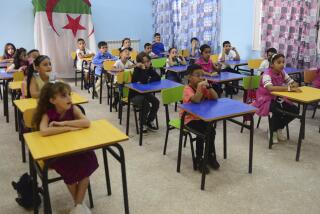Unique School Teaches Many Tongues
- Share via
BRUSSELS — It looks like any other school--teachers striding from class to class clutching armfuls of papers, a packed schoolyard, art projects pinned to the walls.
But the European School, in one of Brussels’ affluent suburbs, is part of a unique experiment in education that has endured for more than 30 years.
Rather than a national curriculum, there is a European one. Children learn history, geography and economics in a foreign language, taught by teachers from all 12 European Community states. When they graduate at about age 18, many students are proficient in three or four languages.
“The school develops a great awareness of what it is to be European, far more so among the children than among their parents,” headmaster John Marshall said.
His school is one of nine set up by the European Community to provide free education for the sons and daughters of its officials.
Are they showing the way as the European Community moves toward economic--and perhaps eventually political--union?
Or are the academically rigorous schools simply breeding a new elite, a generation of Eurocrats with a permanent advantage over contemporaries educated more conventionally?
“You may tell me it’s elitist,” said Marshall, a 52-year-old former French teacher and school inspector in Britain. “But it’s designed for able children and there is an enormous cross-pollination of cultures.”
Three of the nine EC schools are in Belgium; Marshall’s, with almost 3,400 pupils, is the biggest. Started in 1958, it is funded by the Community and its 12 national governments.
Most of the students’ parents are EC officials, although fee-paying children of diplomats or business executives are admitted. Brussels, headquarters for NATO and the EC, is packed with people who want their children taught at the European School, not least because it is cheaper than the many other international schools here.
Marshall concedes that many of his pupils come from privileged backgrounds, with experience of travel and different cultures through their parents’ jobs. Many already speak at least one foreign language.
The teachers, some of whom send their own children here, are not eager to go home when their government-sponsored contracts run out. “It’s all so parochial in comparison,” said one.
The school regards language as a means to an end rather than a subject in itself.
Children enter one of eight language sections--English, French, German, Italian, Spanish, Greek, Dutch or Danish--depending on the language at which they are best. English is the most popular section.
They stay in these sections from kindergarten until the European baccalaureate exam at the age of 18.
Teachers say it is crucial for the children to develop a clear identity in one language and are unhappy when ambitious parents push young children into learning too many.
“We have had kids who have no mother tongue. They are illiterate in four languages,” Marshall said.
Children begin a first foreign language at the age of 6. From 12 or 13 they learn history and geography in that language, a subject they must follow right through to the baccalaureate.
From 12 they may start a second language and more can be added later, including Latin.
The baccalaureate is tough but widely regarded as a passport to European or North American universities, which is where most pupils go. Business studies or law are popular options.
History and geography present problems of national bias. Historical figures like Joan of Arc or Napoleon, for instance, are revered in France but often criticized in Britain.
Most teachers at the school say that, as a result, most national textbooks, in whatever language, are almost useless. They use copies of original documents or prepare their own material.
Irishman Richard Galvin is teaching a multicultural class of 12-year-olds about acid rain and refers constantly to different countries across Europe, combining facts with the teaching of English vocabulary.
“Pollution doesn’t stop at national borders,” he tells them.
In the schoolyard, children start speaking in French and then turn to other friends and speak German or Spanish.
“You have to be independent, put yourself to work,” said Bas Foppema, a 17-year-old Dutch youth who speaks flawless English. “No teacher is going to tell you what to do.”
But there are problems with children who don’t make the grade, since the school insists on mixed-ability classes and aims solely at getting pupils through the baccalaureate.
Almost one pupil in 10 has to repeat a year because of unsatisfactory marks.
More to Read
Sign up for Essential California
The most important California stories and recommendations in your inbox every morning.
You may occasionally receive promotional content from the Los Angeles Times.













